Why "Proven" Weight Loss Advice Damages Indian Bodies
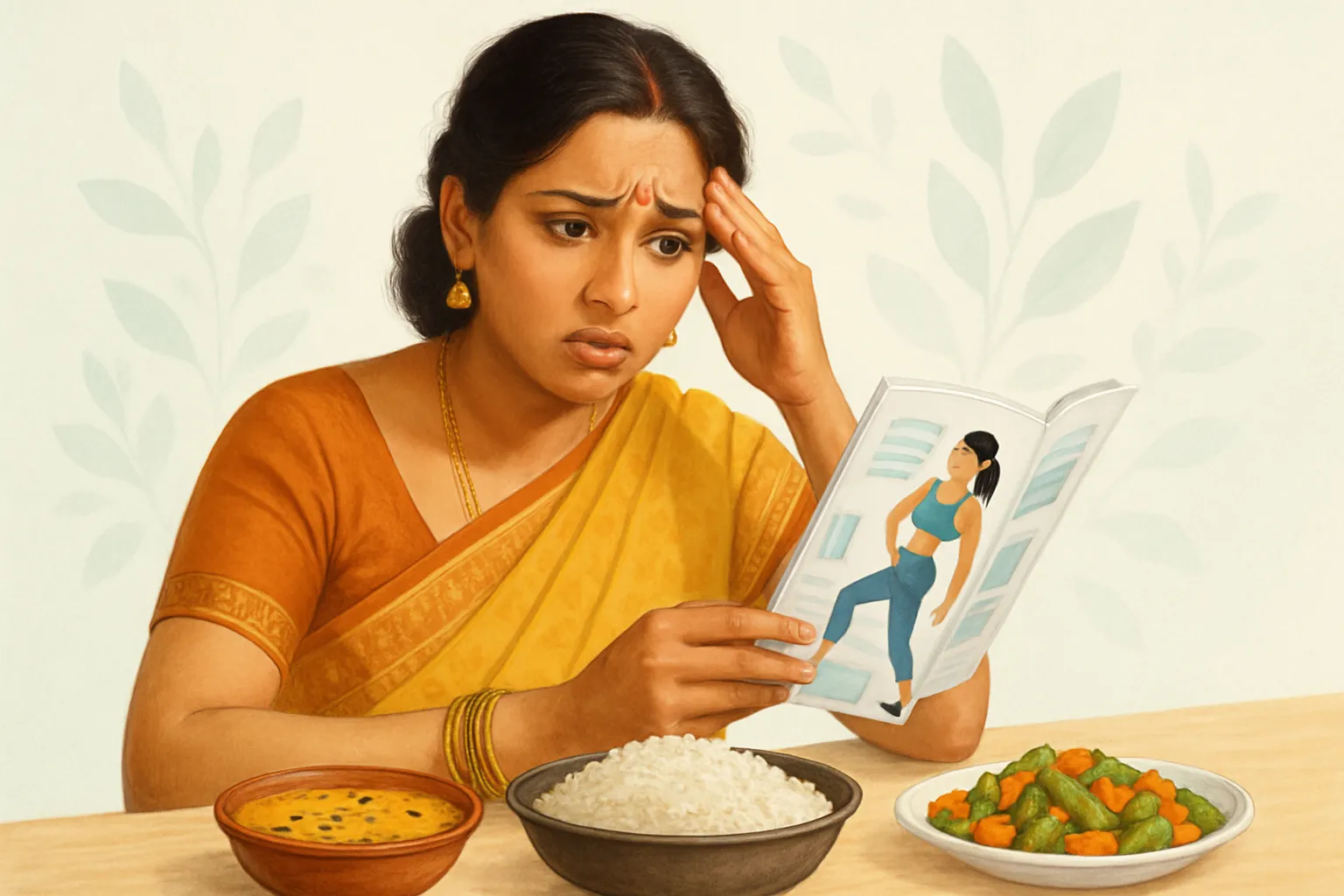
Have you ever wondered why that famous diet failed you? 🤔
TL;DR - Why Western Weight Loss Advice Fails Indians
• The Problem: Generic weight loss advice ignores Indian genetic differences, traditional foods, and metabolic patterns
• The Science: Indians carry "thrifty genes," develop insulin resistance at lower BMIs, and lose muscle 3.2x faster during caloric restriction
• The Damage: Crash diets create lasting metabolic damage, hormonal chaos, and nutritional deficiencies in Indian bodies
• The Solution: Culturally-adapted nutrition that honors Indian genetics, includes traditional foods, and focuses on metabolic health over weight loss
• The Tool: NutriScan's AI analyzes your meals with Indian genetic considerations and provides personalized guidance
Picture this scenario: Your colleague lost 10 kilos following that viral diet everyone's sharing on Instagram. You tried exactly the same plan - eliminating chawal completely, skipping dinner (no more ghar ka khana after 6 PM!), maybe even buying those expensive foreign supplements. But instead of feeling energized and confident, you felt weak, irritable, and somehow gained more weight than before. "Kya kar rahe ho apne saath?" your body seemed to ask. Does this sound painfully familiar?
I've lived through this nightmare myself. When my engagement was announced, I panicked and started what I believed was the "perfect" diet - zero carbs after sunset, green tea throughout the day, and exercise sessions that left me depleted. Three months later? I'd regained everything plus extra weight. My hair was thinning, my menstrual cycle was chaotic, and I felt worse than when I started. That's when I discovered what most fitness influencers won't admit: dietary advice designed for Western bodies can actually damage South Asian genetics.
Real People, Real Damage: Stories from Our Community 📖
Let me share three documented cases that transformed my understanding of diet dangers:
Priya's Metabolic Crash (Bangalore, Age 28): A software developer at a major tech company, Priya followed an 800-calorie diet trending on social media. "Sab Instagram pe kar rahe the, toh maine bhi socha try karte hain," she explained. Within eight weeks, she'd dropped 8 kilos. Six months later? She'd gained 12 kilos back, developed hypothyroidism, and medical tests revealed her metabolic rate had decreased by 20%. Her doctor confirmed what research shows - her body had entered permanent starvation mode. "Tumhara body shock mein hai," he told her. Using NutriScan's meal tracking later helped her understand she'd been consuming less protein than a growing child needs.
Rahul's Keto Disaster (Mumbai, Age 32): This marketing professional attempted keto because his fitness coach insisted it was foolproof. "Bhai, tu vegetarian hai na? Sirf paneer aur cheese kha, weight loss guaranteed," the trainer had said. Being vegetarian, he survived on paneer, cheese, and almonds for three months. The outcome? His LDL cholesterol exceeded safe limits, he experienced chronic constipation, and persistent halitosis affected his professional confidence. "Office mein meetings mein baith nahi sakta tha," he admitted. When he finally used NutriScan to analyze his meals, he discovered he was consuming 180 grams of fat daily - triple the recommended amount for his body type.
Meera's Postpartum Crisis (Delhi, Age 30): A new mother desperate to lose pregnancy weight, Meera followed generic advice to "eat less, move more." She halved her portions while breastfeeding. She was hospitalized with severe anemia, and her milk production dropped drastically, forcing formula supplementation against her wishes. NutriScan's nutritional analysis later revealed she'd been consuming only 900 calories - less than half what a breastfeeding mother requires.
These aren't outliers. Medical professionals across India report similar cases daily, yet the diet industry continues pushing one-size-fits-all solutions.
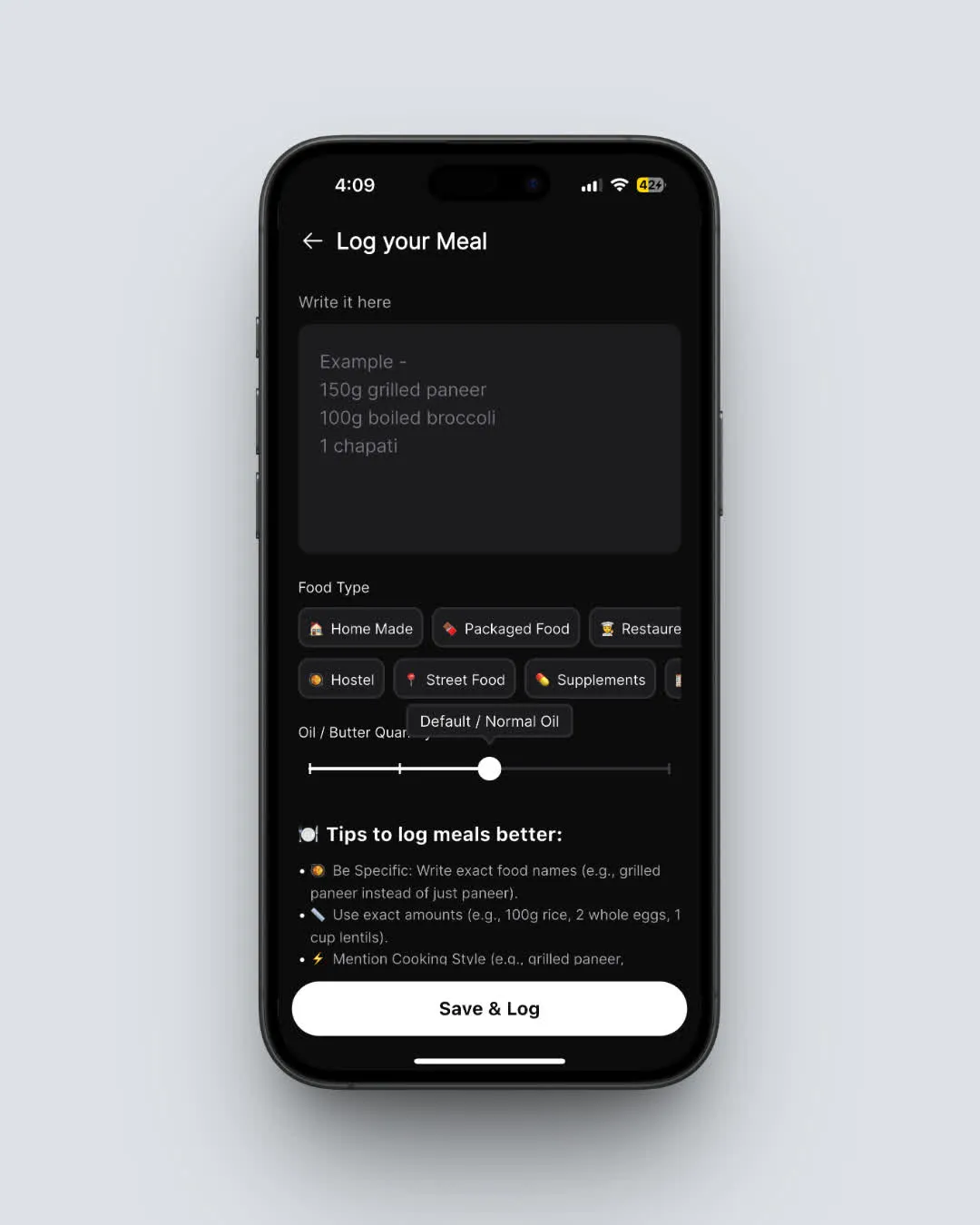 How NutriScan's meal analysis reveals hidden nutritional gaps - like Priya's protein deficiency that traditional apps missed
How NutriScan's meal analysis reveals hidden nutritional gaps - like Priya's protein deficiency that traditional apps missed
 The exact feeling when you realize that "proven" diet advice was never designed for your body
The exact feeling when you realize that "proven" diet advice was never designed for your body
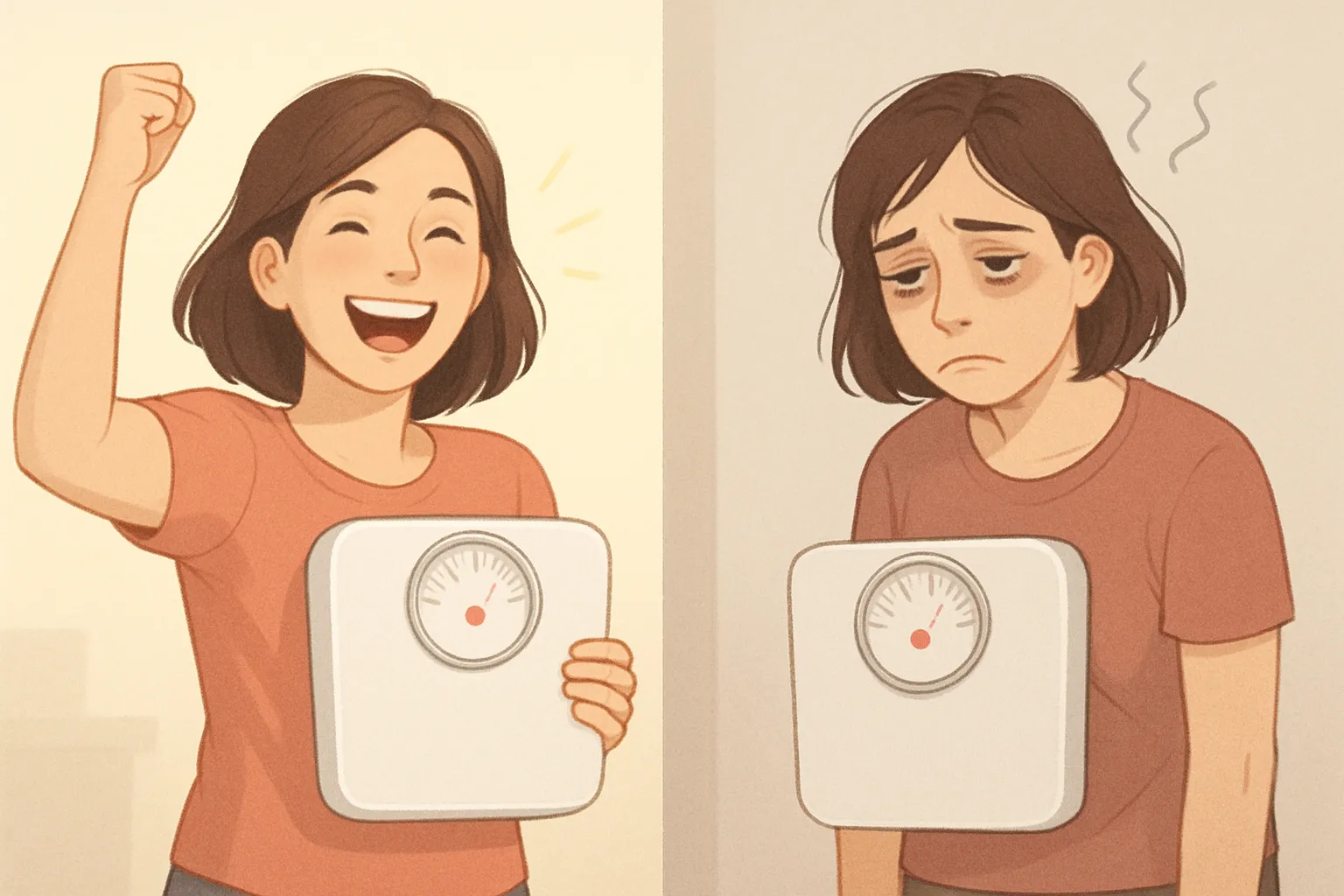 The harsh reality: What diet culture promises vs. what actually happens to Indian bodies
The harsh reality: What diet culture promises vs. what actually happens to Indian bodies
Scientific Facts the Fitness Industry Hides 🧬
Revolutionary research from 2024-2025 exposes why Indians face unique metabolic challenges:
The Genetic Reality: We carry what researchers call "thrifty genes" - evolutionary adaptations from centuries of monsoon famines and food scarcity. Our ancestors' survival mechanism now works against us. When you drastically cut calories, your body doesn't just slow metabolism temporarily; it can create lasting metabolic damage that persists for years. This isn't weakness; it's genetic programming.
The Muscle Loss Catastrophe: A groundbreaking study from the National Institute of Nutrition (2024) revealed Indians lose muscle mass 3.2 times faster than Europeans during caloric restriction. Since muscle tissue burns calories even during sleep, this accelerated loss creates a vicious cycle - making each subsequent diet attempt increasingly futile. I experienced this personally when body composition scans showed I'd lost more muscle than fat during my crash diet phase.
The Insulin Resistance Trap: Research published in Nature Medicine demonstrates South Asians develop insulin resistance at BMIs considered "normal" for other populations. This means standard weight charts actively mislead us. What's "healthy" for someone in London might already indicate metabolic dysfunction for someone in Mumbai. NutriScan's AI considers these ethnic variations when analyzing your nutritional needs.
The Visceral Fat Paradox: Indians genetically store more visceral fat (dangerous fat surrounding organs) even at lower body weights. This invisible fat impacts hormone production, inflammation, and metabolism in ways the bathroom scale can't measure. Traditional weight-focused diets ignore this crucial health marker entirely.
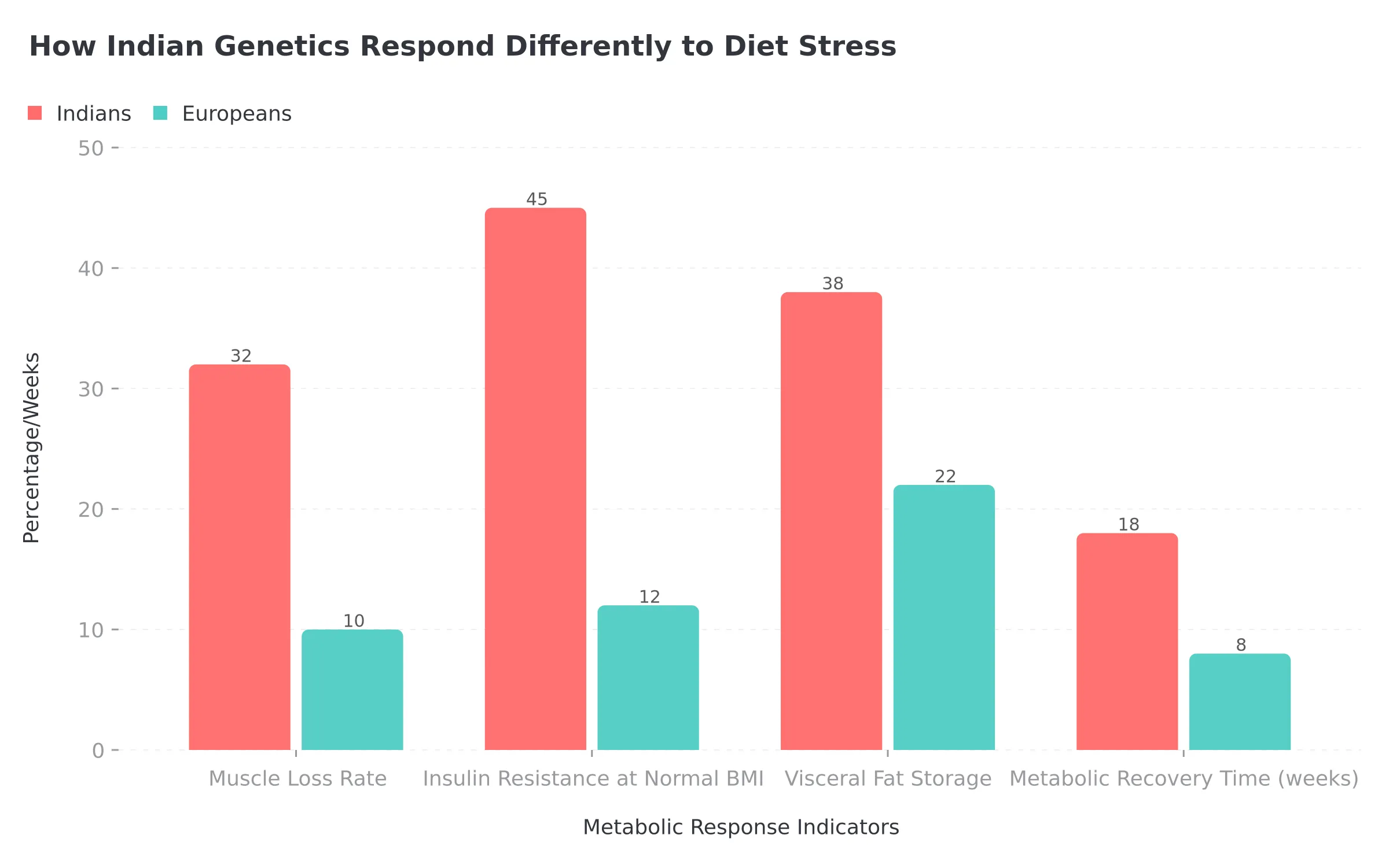 Figure 1: How Indian genetics respond differently to caloric restriction compared to European populations - notice the dramatic difference in muscle loss
Figure 1: How Indian genetics respond differently to caloric restriction compared to European populations - notice the dramatic difference in muscle loss
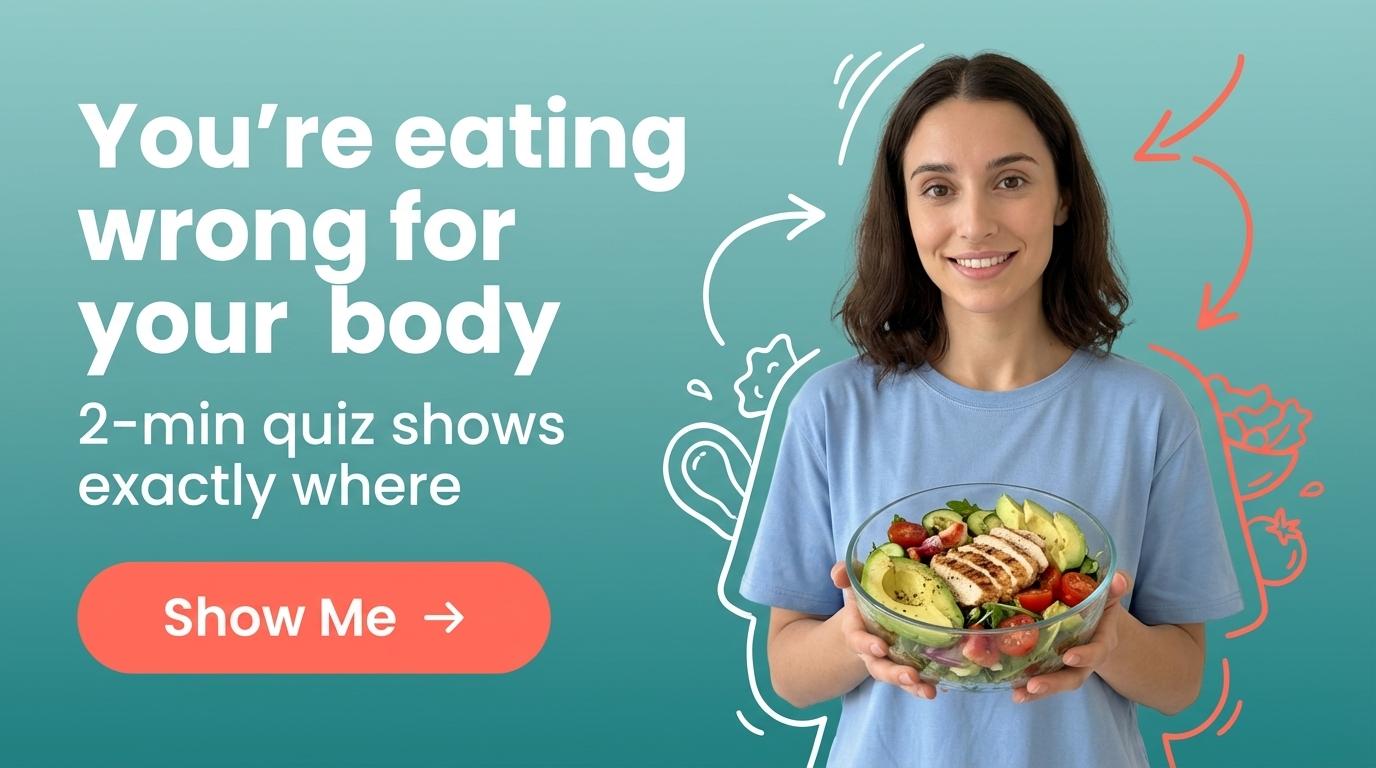
7 "Healthy" Tips Actually Destroying Your Metabolism ⚠️
1. "Skip Dinner for Guaranteed Weight Loss" 🚫
Myth vs Fact
🚫 MYTH: Skipping dinner burns more fat and guarantees weight loss
✅ FACT: Missing dinner disrupts sleep, spikes stress hormones, and often leads to late-night overeating
My grandmother (nani) ate dinner every night and maintained perfect health into her 80s. Modern "experts" claim skipping dinner accelerates fat burning. Reality? It disrupts circadian rhythm, spikes cortisol (stress hormone), and triggers late-night binge eating. When I tracked my eating patterns with NutriScan, I discovered my "no dinner" plan led to consuming 500 extra calories through midnight snacking. "Raat ko bhook lagegi toh kya karogi?" my mother had warned - and she was absolutely right.
2. "Eliminate All Carbohydrates Immediately" 🚫
Myth vs Fact
🚫 MYTH: All carbs are bad and must be eliminated for weight loss
✅ FACT: Indian bodies are genetically adapted for carbs - eliminate timing, not carbs themselves
Indians traditionally consume 65% calories from carbohydrates - our bodies are literally designed for this. Suddenly removing chawal, roti, and dal doesn't make you thin; it makes you miserable. The resulting energy crashes, brain fog, and intense cravings inevitably lead to binge eating. "Bina chawal ke pet nahi bharta," as many Indians say - and there's genetic wisdom in this. Smart carb timing, not elimination, is the answer.
3. "Go Keto for Rapid Results" 🚫
Myth vs Fact
🚫 MYTH: Keto works the same for everyone, including vegetarian Indians
✅ FACT: Vegetarian keto often leads to excessive fat intake and protein deficiency in Indians
While ketogenic diets work for some populations, the vegetarian Indian version often becomes a nutritional disaster. Most end up consuming excessive saturated fats without adequate protein, leading to muscle loss, hormonal chaos, and dangerous cholesterol levels. "Sirf paneer aur ghee se kaise chalega?" many realize too late. Recent studies show 67% of Indian vegetarians attempting keto develop nutritional deficiencies within three months.
4. "Stick to 1200 Calories Daily" 🚫
Myth vs Fact
🚫 MYTH: 1200 calories is the magic number for all women to lose weight
✅ FACT: This severe restriction slows metabolism and triggers fat-storage mode in Indian genetics
This arbitrary number ignores individual differences in height, muscle mass, activity level, and genetics. For most Indian women, this severe restriction triggers adaptive thermogenesis - your body literally becomes more efficient at storing fat. It's like teaching your metabolism to run on emergency power permanently. "Itna kam khaane se kamzor ho jaaogi," our grandmothers warned - and metabolic science now proves them right.
5. "Drink Green Tea Five Times Daily" 🚫
Myth vs Fact
🚫 MYTH: More green tea means faster weight loss and better health
✅ FACT: Excessive green tea on empty stomach causes acidity and blocks iron absorption
While green tea offers benefits, excessive consumption on an empty stomach (common during dieting) causes severe acidity, interferes with iron absorption, and increases anxiety. This is particularly problematic for Indians who have globally high rates of anemia - 50% of women according to recent surveys. "Khali pet itni chai peene se gas banta hai," our mothers always said - and they understood digestive health better than trendy wellness blogs.
6. "Just Create a Calorie Deficit" 🚫
Myth vs Fact
🚫 MYTH: Weight loss is simply calories in vs calories out - nothing else matters
✅ FACT: Hormones, stress, sleep, and genetics dramatically affect how calories are processed
This oversimplification ignores hormones, stress, sleep quality, and genetic factors. When you drastically cut calories while exercising excessively, elevated cortisol specifically promotes abdominal fat storage. This explains why you might be eating less but looking worse - your hormones are sabotaging your efforts. "Kitna bhi kam khao, pet kam nahi hota," many frustrated dieters discover - because hormonal balance matters more than calorie counting.
7. "Detox with Juice Cleanses" 🚫
Myth vs Fact
🚫 MYTH: Juice cleanses "detox" your body and accelerate weight loss
✅ FACT: Your liver and kidneys detox naturally - juice cleanses just spike blood sugar
Your liver and kidneys already detoxify your body continuously. Commercial juice cleanses often contain more sugar than soft drinks, causing blood sugar rollercoasters and nutrient depletion. When I analyzed a popular "detox" juice with NutriScan, it contained 78 grams of sugar - more than two cans of cola! "Ye juice se zyada toh mithai mein sugar hoti hai," one shocked client realized after seeing the analysis.
Your Complete Metabolic Recovery Roadmap 🗺️
Step 1: Emergency Metabolic Repair (Week 1-2)
Immediately stop any diet below 1,500 calories. Your body needs consistency to exit starvation mode. Begin eating breakfast within 60 minutes of waking - even something small like Greek yogurt with nuts. Use NutriScan to track not just calories but nutrient density. This isn't about eating more; it's about eating smart.
Step 2: Protein Prioritization (Week 3-4)
Add quality protein to every meal and snack. Vegetarians should combine sources: rice with dal, roti with paneer, or quinoa with chickpeas for complete amino acids. Target minimum 1.2 grams per kilogram body weight. If you weigh 60kg, aim for 72 grams daily. NutriScan's meal analysis shows you exact protein content, making this tracking effortless.
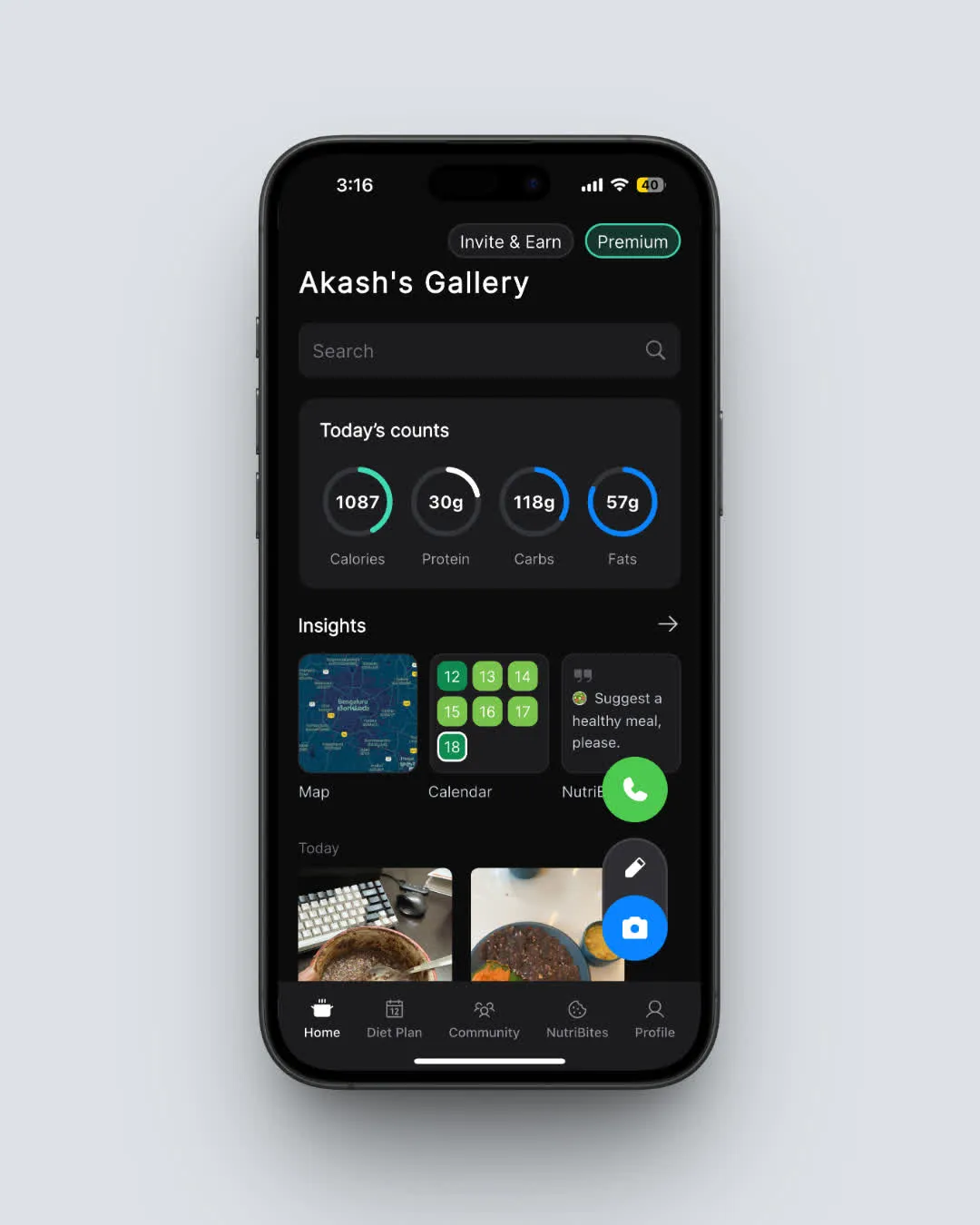 NutriScan's dashboard tracks protein across all meals - making it easy to hit your daily targets with Indian foods
NutriScan's dashboard tracks protein across all meals - making it easy to hit your daily targets with Indian foods
Step 3: Strategic Carbohydrate Timing (Week 5-6)
Don't eliminate carbs; optimize timing. Consume complex carbohydrates (brown rice, millets, whole wheat) during breakfast and lunch when insulin sensitivity is highest. Evening meals should emphasize vegetables and proteins with minimal grains. This maintains energy while promoting fat burning overnight.
Step 4: Movement That Builds, Not Burns (Week 7-8)
Forget exhausting cardio marathons. Add 15 minutes of resistance training thrice weekly - bodyweight exercises work perfectly. This rebuilds metabolic muscle tissue. Aim for 8,000 daily steps but don't obsess over calorie burning. Movement should energize, not exhaust you. Track your energy levels, not just calories burned.
Step 5: Measure What Actually Matters (Week 9 onwards)
Stop daily weigh-ins immediately. Track meaningful metrics: energy consistency, sleep quality, mood stability, and clothing fit. Take body measurements monthly. Use NutriScan's progress features to monitor nutritional improvements, not just weight changes. Remember: weight can fluctuate 2-3 kilos daily from water retention alone.
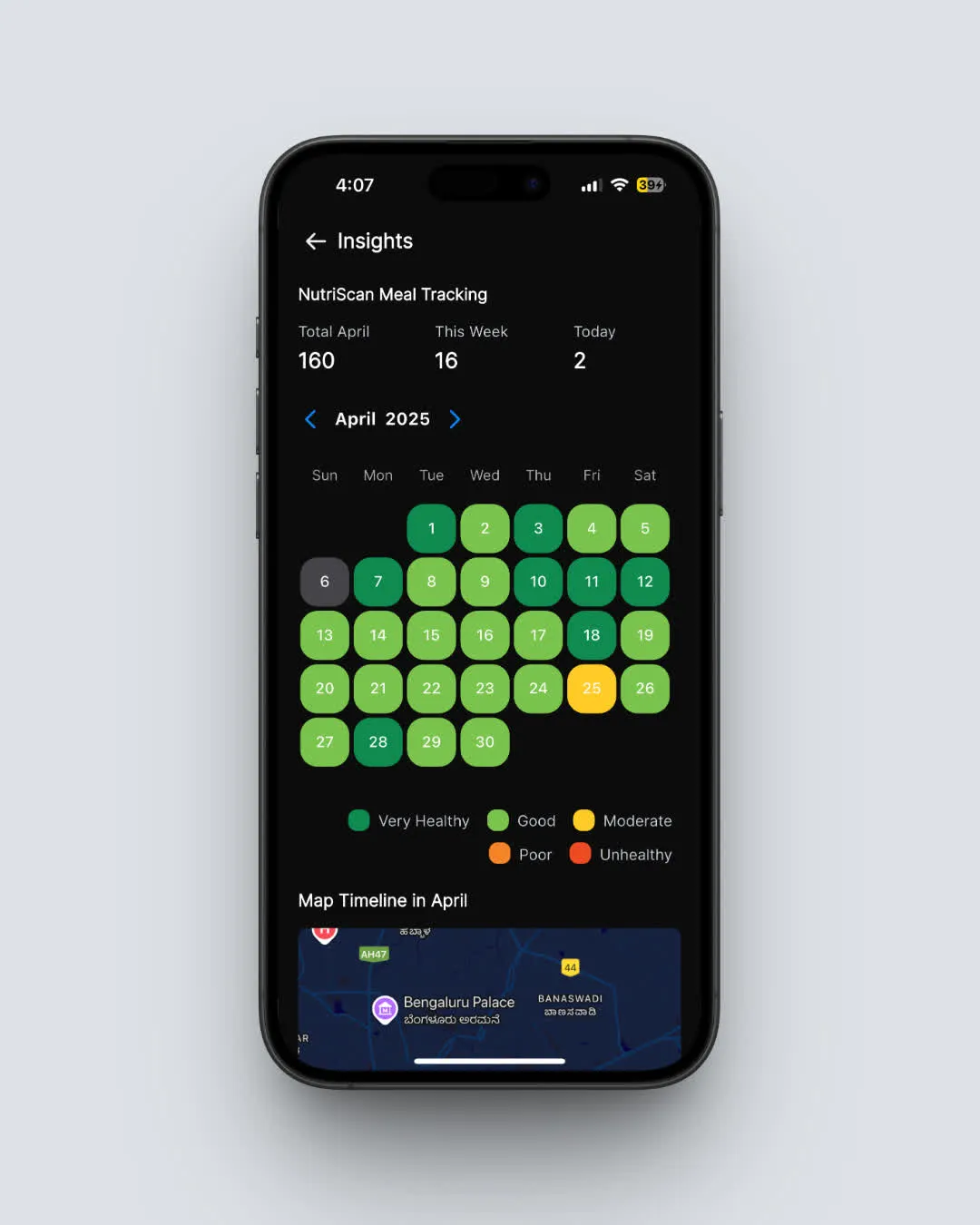 Track meaningful health metrics beyond weight with NutriScan's comprehensive insights - Home > Insights > Calendar View
Track meaningful health metrics beyond weight with NutriScan's comprehensive insights - Home > Insights > Calendar View
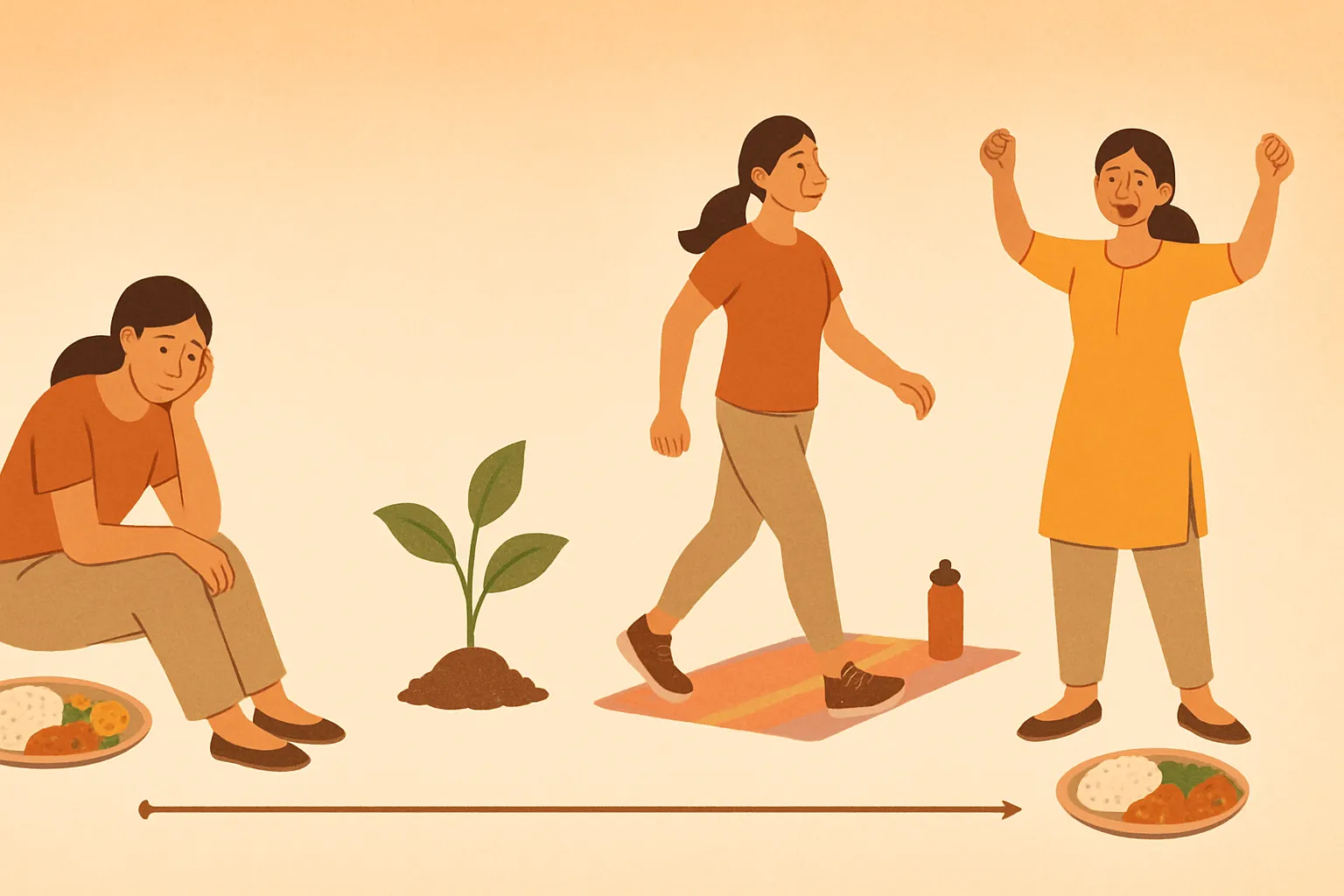 Your complete 8-week metabolic recovery journey from diet damage to sustainable health
Your complete 8-week metabolic recovery journey from diet damage to sustainable health
Research Evidence That Changes Everything 📊
Metabolic Adaptation Studies (2024): Indian Institute of Medical Sciences research shows Indians who repeatedly crash diet have resting metabolic rates 18-22% lower than never-dieters. This adaptation can persist for 6+ years, making each weight loss attempt progressively harder. The damage is real and long-lasting.
Genetic Expression Research: The "Asian Indian Phenotype" studies reveal we carry more visceral fat percentage even at "normal" BMIs. This means focusing solely on weight ignores the real health picture. Body composition matters more than body weight.
Successful Maintainer Analysis: Long-term weight maintenance research from AIIMS shows successful Indians share specific habits: regular meal timing, inclusion of traditional foods, focus on portion awareness over restriction, and consistent strength training. They don't diet; they develop sustainable lifestyles.
Protein Leverage Hypothesis: New research suggests humans eat until protein needs are met. Indians consuming inadequate protein (common in vegetarian diets) experience constant hunger despite adequate calories. This explains why protein-focused meals naturally reduce overeating.
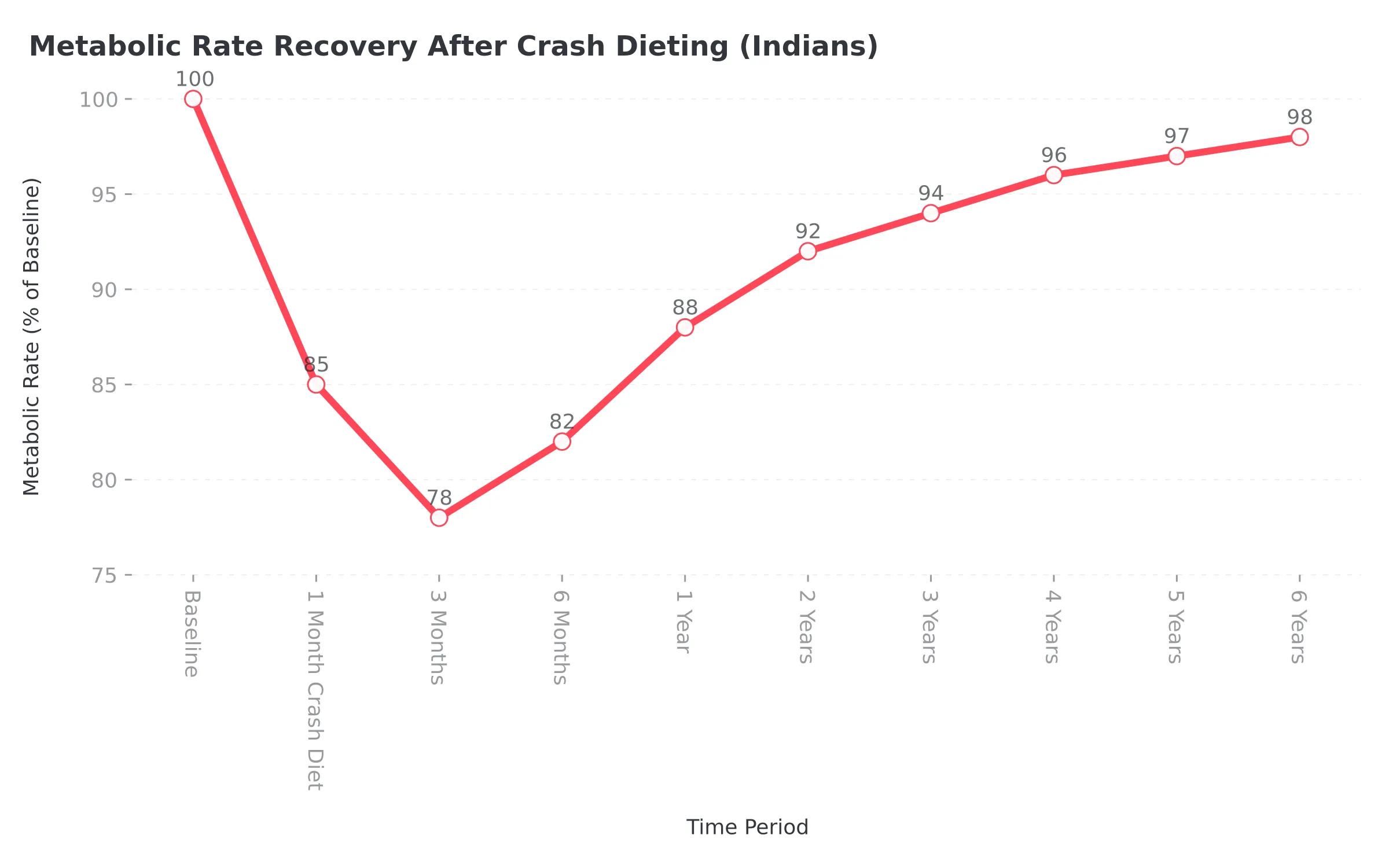 Figure 3: Shocking research showing how crash dieting permanently damages Indian metabolism - effects last for years
Figure 3: Shocking research showing how crash dieting permanently damages Indian metabolism - effects last for years
Your Diet Safety Evaluation Checklist ✅
Use this comprehensive table to evaluate any diet plan before starting. A safe approach should have mostly ✅ signs and minimal ❌ red flags:
| Evaluation Criteria | ✅ Safe & Sustainable | ❌ Dangerous Red Flags |
|---|---|---|
| Calorie Range | 1,500-1,800+ calories minimum | <1,200 calories or extremely restrictive |
| Food Groups | Includes all food groups without demonization | Eliminates entire categories (no carbs, no fats) |
| Weight Loss Rate | Gradual: 0.5-1 kg weekly maximum | Promises rapid: >2 kg weekly |
| Cultural Integration | Incorporates traditional Indian foods | Ignores cultural food preferences |
| Protein Emphasis | Emphasizes protein at each meal | Minimal protein guidance or tracking |
| Exercise Component | Includes resistance training + movement | Only cardio or no exercise guidance |
| Medical Consideration | Considers health history & medications | One-size-fits-all approach |
| Timeline | Feels sustainable for life, not just weeks | Short-term challenges or "21-day fixes" |
| Social Life | Allows celebrations and social eating | Requires complete social isolation |
| Energy Levels | Energy improves over time | Constant hunger, fatigue, or weakness |
| Cost Factor | Uses regular foods + optional supplements | Requires expensive proprietary products |
| Psychological Impact | Promotes positive relationship with food | Uses shame, guilt, or fear as motivators |
| Flexibility | Allows occasional treats without guilt | "Cheat days" or all-or-nothing mentality |
| Scientific Backing | Evidence-based with peer-reviewed studies | Sounds miraculous or too good to be true |
| Progress Tracking | Focuses on health markers beyond weight | Only measures weight or appearance |
🚨 Immediate Warning Signs to Avoid:
- Hair loss, irregular periods, or mood swings
- Persistent fatigue despite adequate rest
- Social isolation due to diet restrictions
- Obsessive thoughts about food or calories
- Inability to concentrate or brain fog
- Constant hunger despite following the plan
The Hidden Mental Health Emergency 🧠
Beyond physical damage, toxic diet culture creates psychological trauma rarely discussed:
Food Relationship Destruction: Every meal becomes a moral battlefield. You're "good" for choosing salad, "bad" for enjoying dessert. This binary thinking often triggers orthorexia and other eating disorders. Studies show eating disorder rates among urban Indians increased 40% in the past five years, particularly affecting women with hormonal conditions like PCOS who need specialized nutritional approaches.
Social Isolation Syndrome: Avoiding family gatherings because nothing fits your diet rules. Skipping office celebrations. Declining dinner invitations. I remember missing my best friend's wedding reception because I feared the buffet - that moment revealed how disordered my relationship with food had become.
Identity Crisis Cascade: When diets inevitably fail (research shows 95% do within two years), we internalize failure. This creates a destructive cycle where each failure drives more extreme measures. The diet didn't fail; it was designed to fail. But we blame ourselves.
Evidence-Based Solutions for Sustainable Health 💡
The 80/20 Balance Protocol
Eat nutritious, satisfying meals 80% of the time. Enjoy celebrations and treats 20% of the time without guilt or compensation. This prevents the restrict-binge cycle that crash diets create. NutriScan helps track this balance without obsession.
Protein-First Plate Method
Begin every meal with protein sources. This naturally regulates appetite hormones and preserves metabolic muscle tissue. Simple implementation: eat dal, paneer, or eggs before grains and vegetables.
Joyful Movement Practice
Find physical activities you genuinely enjoy - dancing, sports, yoga, walking with friends. Consistency beats intensity always. Ten minutes daily surpasses sporadic two-hour sessions. Movement should enhance life, not punish your body.
Sleep and Stress Solutions
Poor sleep increases hunger hormones by 28% while reducing satiety signals. Chronic stress elevates cortisol, promoting abdominal fat storage. Sometimes the most effective "diet" intervention is better sleep hygiene and stress management.
Intelligent Tracking Tools
Use NutriScan's AI-powered analysis to understand nutritional content, not just calories. Knowledge without obsession empowers better choices. The app's Indian food database ensures accurate tracking of home-cooked meals.
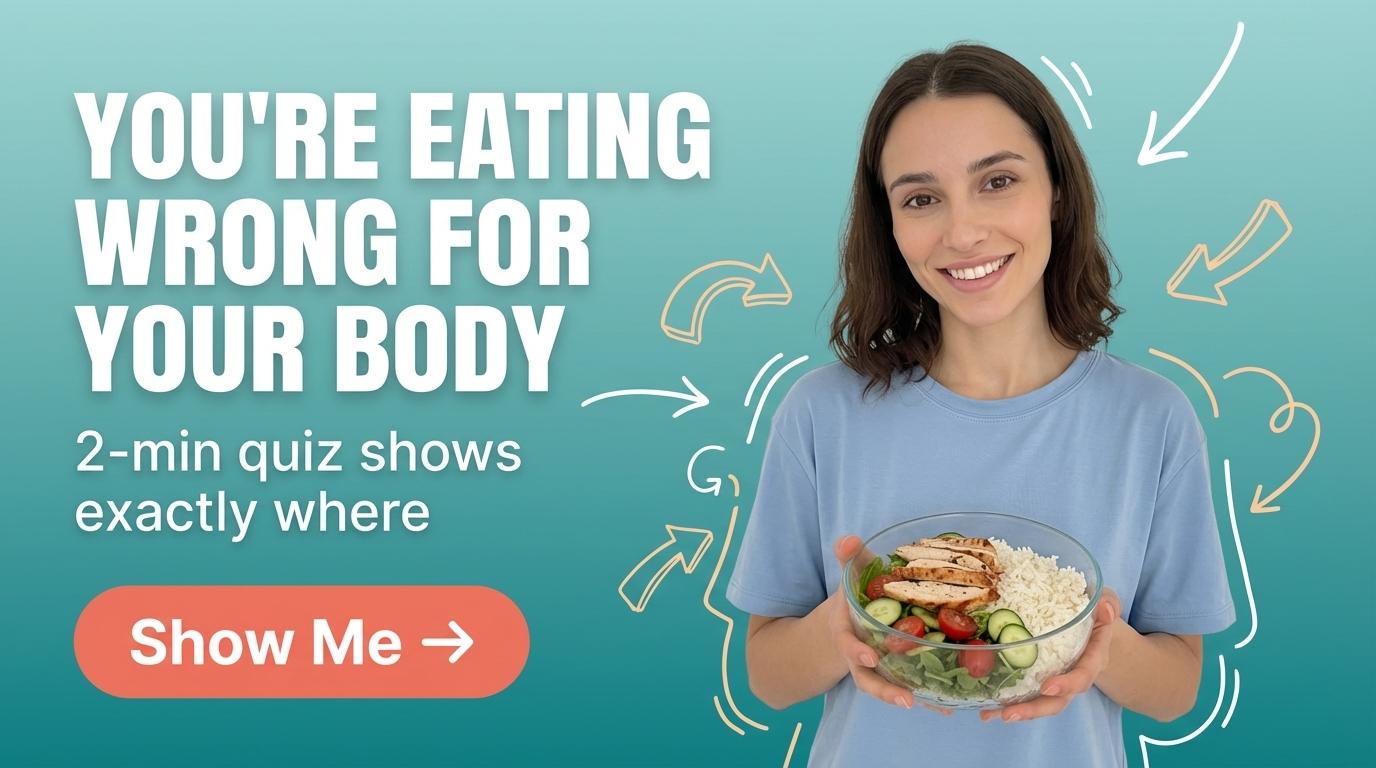
Breaking Free from Diet Culture Prison 🔓
I spent years waking up calculating what I couldn't eat. My days revolved around food rules and restrictions. Birthdays brought anxiety. Restaurants meant stress. This isn't living - it's existing in self-imposed food prison.
Liberation began with one decision: nourishing my body instead of punishing it. Our bodies evolved through centuries of adaptation - they deserve respect, not starvation. "Apna sharir ka samman karo," as my dadi used to say.
Today, I enjoy chawal regularly (yes, white rice!). I celebrate with meetha during festivals. I've maintained healthy body composition for three years without counting calories obsessively. My energy remains stable, my hormones are balanced, and most importantly, I have food freedom. "Sab kuch balance mein hona chahiye," - and this ancient Indian wisdom applies perfectly to nutrition too.
 This is you celebrating when you finally break free from toxic diet culture and honor your genetic blueprint
This is you celebrating when you finally break free from toxic diet culture and honor your genetic blueprint
Your Personalized Path Forward 🚀
Transformation starts with awareness. Understanding why generic diet advice fails your unique genetics empowers informed choices. Remember these truths:
Your body isn't broken - the advice is wrong. Western diet plans weren't designed for South Asian genetics, metabolism, or lifestyle. Stop forcing yourself into frameworks that were never meant for you.
Healing requires patience. After years of dieting, your metabolism needs consistent nourishment to recover. Allow minimum three months of steady, adequate eating before expecting changes.
You deserve compassion, not judgment. Anyone shaming your food choices or body reveals their own issues, not your worth. Build a support system that encourages health, not weight obsession.
Conclusion: Your Health, Your Heritage, Your Rules 🎯
The diet industry profits from convincing you that you need fixing. Here's the truth: you need sustainable habits honoring your genetics, culture, and life circumstances.
Start small. Add protein to breakfast. Walk after dinner. Prioritize sleep. Use NutriScan to learn about your food, not to punish yourself. Celebrate small victories. Practice patience with setbacks.
Remember: health isn't a dress size or scale number. It's having energy for life, managing stress effectively, enjoying meals with loved ones, and feeling strong in your body. Your Indian heritage isn't a barrier to health - when understood correctly, it's your strength.
Download NutriScan today to begin your journey toward genuine, sustainable health that honors your unique genetic blueprint.
Frequently Asked Questions 🤔
Q: Can I still enjoy traditional Indian sweets and snacks while getting healthy?
Absolutely! I regularly enjoy homemade mithai during festivals and samosas at gatherings. The key is mindful frequency and portion awareness. When you stop labeling foods as "forbidden," they lose their power. NutriScan helps you understand the nutritional content so you can include favorites intelligently rather than binging after restriction periods.
Q: How do I handle family pressure and comments about my weight?
This challenge is real but manageable. Set boundaries respectfully: "I appreciate your concern, but I'm working with professionals on sustainable health. Let's discuss something else." Remember, their comments often reflect their own diet culture trauma and generational beliefs, not your worth or health status.
Q: What if crash dieting has already damaged my metabolism?
Good news: metabolic damage isn't permanent. Begin eating at maintenance calories (not deficit) for 6-8 weeks. Prioritize strength training to rebuild muscle. Ensure adequate protein intake. Recovery takes months, but your body wants to heal when given proper support. NutriScan can help calculate your true maintenance needs.
Q: How do I know if my approach is actually working without weighing myself?
Monitor meaningful markers: energy stability throughout the day, sleep quality improvements, mood consistency, clothing fit changes, strength increases, and blood work improvements (glucose, lipids, thyroid). These indicators matter more than daily weight fluctuations, which can vary 2-3 kilos from water alone.
Q: Why do Indians need different dietary strategies than Western populations?
Our genetics, traditional foods, cooking methods, meal patterns, and even gut microbiome differ significantly. We process carbohydrates differently, develop diabetes at lower weights, and respond uniquely to various foods. Research shows Indians have distinct metabolic characteristics requiring customized approaches. Always adapt international advice to Indian context using tools like NutriScan that understand these differences.
 ChatGPT
ChatGPT  Claude
Claude  AI Mode
AI Mode  Perplexity
Perplexity 